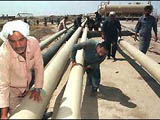|
|
TODAY.AZ / Business
Turkey-Israel energy talks to focus on multiple pipelines
06 December 2006 [13:33] - TODAY.AZ

The Turkish energy minister will visit Israel on Dec. 13, when the two countries are expected to push the button for feasibility studies.
Israel intends to buy Russian natural gas via Turkey and has been holding talks with Russia's gas exporter Gazprom. Energy Minister Hilmi G?ler and his Israeli counterpart will not only talk about the construction of a pipeline running under the Mediterranean to transport Russian natural gas to Israel but will also discuss a multiple pipeline scheme for the transfer of oil, electricity and water. Israel's plans to buy water from Turkey's Manavgat River facilities were abandoned with the consent of Ankara. The project to sell water to Israel had been on the agenda since the beginning of the 1990s. The construction of facilities on the Manavgat River, which flows to the Mediterranean, was terminated at the end of the 1990s. The two countries were never able to go ahead with a deal, since the cost of water transport dissuaded the Israeli side from buying the water.
A green light from Turkey and Israel on the construction of a pipeline might also be an important step to pave the way towards a strategic partnership on energy between Turkey and Russia. The latter has proposed that Turkey be a strategic transit country for its exports. The proposal was first voiced by Russian President Vladimir Putin during an official visit to Turkey in 2004. It was repeated during President Sezer's visit to Moscow last June.
Russia is going through serious problems with Ukraine, a country through which 80 percent of total Russian exports are transported. Russia's natural gas flow to Europe was at risk last year because of a crisis over the pricing of oil. Russia, with thoughts of bypassing Ukraine, is now making a strategic transit country proposal to Turkey. In this context, under existing circumstances, the capacity of the Blue Stream pipeline, which passes beneath the Black Sea, could be increased, or a parallel second pipeline could be built. According to Russian press, Gazprom and Italian ENI, which built the Blue Stream pipeline, have reached an agreement to build Blue Stream 2. Russia intends to sell its natural gas to Italy and other European countries though Blue Stream 2, and it is also negotiating with Israel to strike a deal on natural gas.
Turkey, however, has not officially responded to Russia's proposal to become a strategic transit country. Turkey on one hand is trying to secure its energy demand in the most economic and safe way and on the other hand wants to develop into a strategic energy transfer point. As a giant energy producer, Russia should be the country Turkey has to pay the most attention to while forming its energy strategy. A major dilemma is facing Turkey regarding Russia. Increasing energy cooperation with its neighbor in the north will lead to more dependency in the energy field. Or focusing on other projects to diversify its energy resources might risk cooperation with Russia.
Problems with Iranian and Azerbaijani natural gas supplies force Turkey to increase cooperation with Russia in the short term. The quality of Iranian natural gas is low. The amount of Azerbaijani natural gas that will flow from the pipeline under construction cannot be determined accurately. Trying to keep all its options open, Ankara is not responding to Russia either negatively or positively. A natural gas pipeline from Turkey to Israel can carry Azeri natural gas just as well as Russian natural gas. With that in mind, Israel is negotiating with Azerbaijan as well as with Russia. Turkish Daily News
URL: http://www.today.az/news/business/33598.html
 Print version
Print version
Connect with us. Get latest news and updates.
See Also
- 16 January 2025 [13:20]
Committee Chairman highlights customs coordination for enhanced trade & regional integration - 16 January 2025 [12:21]
Biden's gift to Trump: what does the US 'partnership' with Armenia hide? - 16 January 2025 [12:18]
Customs cooperation among Turkic states deepens at 10th meeting in Baku - 16 January 2025 [12:02]
Azerbaijani Minister meets with ITU Director Kosmas Zavazava - 16 January 2025 [10:43]
New leadership appointed to Azerbaijan's Innovation and Digital Development Agency - 15 January 2025 [15:53]
Uzbekistan to develop transit routes to Europe via Azerbaijan - 14 January 2025 [15:36]
Azerbaijan and Islamic Development Bank discuss strategic partnership for next decade - 13 January 2025 [15:11]
CBA updates customer compliance rules for electronic fund transfers - 13 January 2025 [13:05]
Heydar Aliyev International Airport sees record growth in 2024, gains global recognition - 13 January 2025 [12:04]
4SIM hosts meeting with 2024 Internship Program Graduates
Most Popular
 Azerbaijani Defense Ministry & Military Prosecutor's Office ink joint plan
Azerbaijani Defense Ministry & Military Prosecutor's Office ink joint plan
 Biden's farewell gift to the Armenians
Biden's farewell gift to the Armenians
 Same Macro, same rake
Same Macro, same rake
 North Korea launches new missile towards Sea of Japan
North Korea launches new missile towards Sea of Japan
 Construction of 3rd railway between Kazakhstan and China begins
Construction of 3rd railway between Kazakhstan and China begins
 Technovation 2024: Bold move towards smoke-free future
Technovation 2024: Bold move towards smoke-free future
 Community condemns biased broadcast by German radio channel
Community condemns biased broadcast by German radio channel
